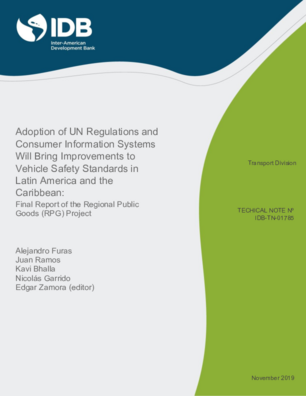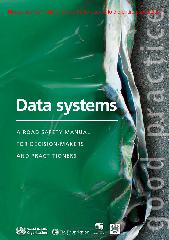2:00 pm - 3:00 pm (Manila time/+8GMT)
Join us for this special knowledge-sharing webinar that will showcase innovative approaches to addressing road safety in schools - as it affects the students' commute, and how to make it a part of their education.
Adoption of UN Regulations and Consumer Information Systems Will Bring Improvements to Vehicle Safety Standards in Latin America and the Caribbean: Final Report of the Regional Public Goods (RPG) Project

The Regional Public Good (RPG) "Support for the Implementation of Vehicle Regulation Standards in Latin America and the Caribbean", is a project that was born in response to the request of the countries of the region on the need to address the safety of vehicles as a key component of road safety, taking into account the low results in vehicle safety evaluations of passenger cars and the high fatality rates in the LAC region.
This study analyzes a list of seventeen (17) UN Regulations on vehicle safety and emissions that were selected by the beneficiary countries. The objective of the BPR is to analyze the regulatory frameworks of the interested countries, propose adjustments to them and provide tools and strategies to the governments of the region to attack the problem of vehicle regulation in terms of safety and emissions. The countries under study in this RPG were Argentina, Brazil, Colombia, Ecuador, Mexico, and Uruguay; however, the report is developed in such a way that its recommendations apply to the entire region. The RPG is made up of three multidisciplinary and interconnected fields.
The first part of the study, carried out by the New Vehicle Evaluation Program for Latin America and the Caribbean, develops an in-depth analysis of the existing local regulations in each of the six signatory countries of the RPG, generates a proposed text regulation for efficient application, analyzes how the homologation process should be and generates tools to support governments for said processes, all of which can be applied in the countries of the region. Technical and operational factors are taken into account for the efficient adoption of effective regulations, contributing to significant reductions in the number of fatalities and injuries due to accidents from the increase in road safety.
The second part of the study, developed by the University of Chicago, focuses on analyzing the potential impacts on health, based on the estimation of the number of lives that would be saved and the burden of disability avoided, as a consequence of the adoption of the safety regulations, as well as other aspects that can positively influence the improvement of safety.
Finally, the third part of the study prepared under the supervision of the Economic Commission for Latin America and the Caribbean (ECLAC) analyzes the economic impacts in terms of income and employment, trade and fiscal implications in LAC countries, as a result of the possible adoption of selected UN
Meeting the Global Road Safety Performance Targets: Case Studies from Pakistan and the Philippines
ADB is hosting a special knowledge-sharing webinar that will feature presentations on two road safety case studies that support achievement of the Global Road Safety Performance Targets, and will showcase examples of the key concepts and approaches that will be featured in the upcoming Road Safety Capacity Building Programme to be sponsored by ADB's Transport Sector Group.
Contact Person
Data systems: A road safety manual for decision-makers and practitioners

The fifth good practice manual jointly prepared by WHO, GRSP, the World Bank, and the FIA Foundation focuses on data systems for road safety. Reliable and accurate data are needed for a variety of purposes, including for advocating for road safety, identifying specific problems and risks, setting targets, formulating appropriate strategies and monitoring impact. Road safety data, collected every day in most countries, cannot meet these objectives unless they are properly coded, entered in a system, processed, analysed, disseminated and used.
This manual provides practical guidance for establishing data systems that will improve measurement of a country's road traffic injury problem, facilitate selection of evidence-based interventions, and allow for better evaluation of progress. It discusses the use of such data systems to develop policies and interventions and to assess prevention measures.
The manual presents a conceptual framework for data-led road safety management and presents steps for assessing the availability and quality of existing road safety data. It offers guidance both for making improvements to existing road crash data systems, and for the design and implementation of a new road crash data system.
While stressing the importance of comprehensive data systems that cover not only deaths and injuries from road traffic crashes, but also exposure measures, intermediate outcomes and social costs, the manual acknowledges that most countries are struggling simply to establish quality data systems to document deaths and injuries. The practical guidance related to improving data quality and to improving the effectiveness of data systems therefore focuses mainly on data related to deaths and injuries—and more specifically, on the implementation of a crash database derived from police records. A minimum data set and accompanying definitions for such a database is proposed.
APRSO Annual Meeting Day 2: APRSO member countries set to appoint National Data Coordinators
Contact Person
APRSO Annual Meeting Day 1: Consistent Data Collection Key to Changing Policy and Saving Lives
On day one of the Asia Pacific Road Safety Observatory’s inaugural annual meeting, 130 registered attendees from across 32 member countries and partner organisations gathered on Zoom to discuss the challenge of collecting and collating road safety data for more informed policy making.
Contact Person
Data Drives Road Safety Agenda at APRSO Annual Meeting
On 21st & 22nd April this year ADB will be hosting the first annual meeting of the Asia Pacific Road Safety Observatory. The invite-only virtual event will discuss and seek agreement from 20 APRSO member countries on proposed minimum road safety performance indicators and agree steps towards establishing the APRSO road safety database
Contact Person
At a recent Knowledge Sharing Event entitled Improving Road Safety in Mongolia and Samoa, Youth Project Designer Swithun Rumble revealed a pioneering new MYE Road Safety Model to be piloted in Samoa.
The model challenges the perception of young people’s role in road crashes due to their risky behaviour and reliance on vulnerable modes of transport such as walking and cycling. Instead, it recommends leveraging young people’s inherent qualities, such as resilience, tech-savvy and peer influence, to make them a part of the solution.
APRSO wins Prince Michael International Road Safety Award
We are proud to announce that the Asia-Pacific Road Safety Observatory, along with the African Road Safety Observatory, have been awarded the Prince Michael International Road Safety Award for their outstanding achievement and innovation in improving road safety in their respective regions.
This award recognizes the countries in Africa and the Asia-Pacific that have decided to work together to improve the quality and availability of road safety data in their regions.
Prince Michael of Kent has sent along this short congratulatory message.
Global Meeting of Regional Road Safety Observatories
Pagination
- Previous page
- Page 3
- Next page
